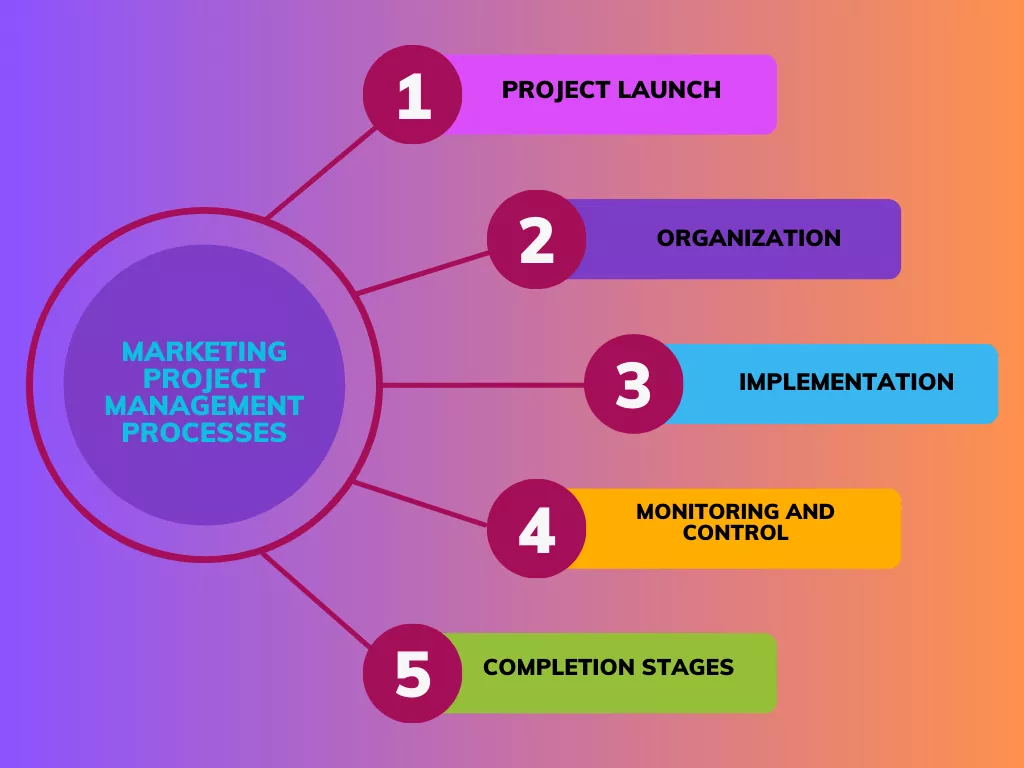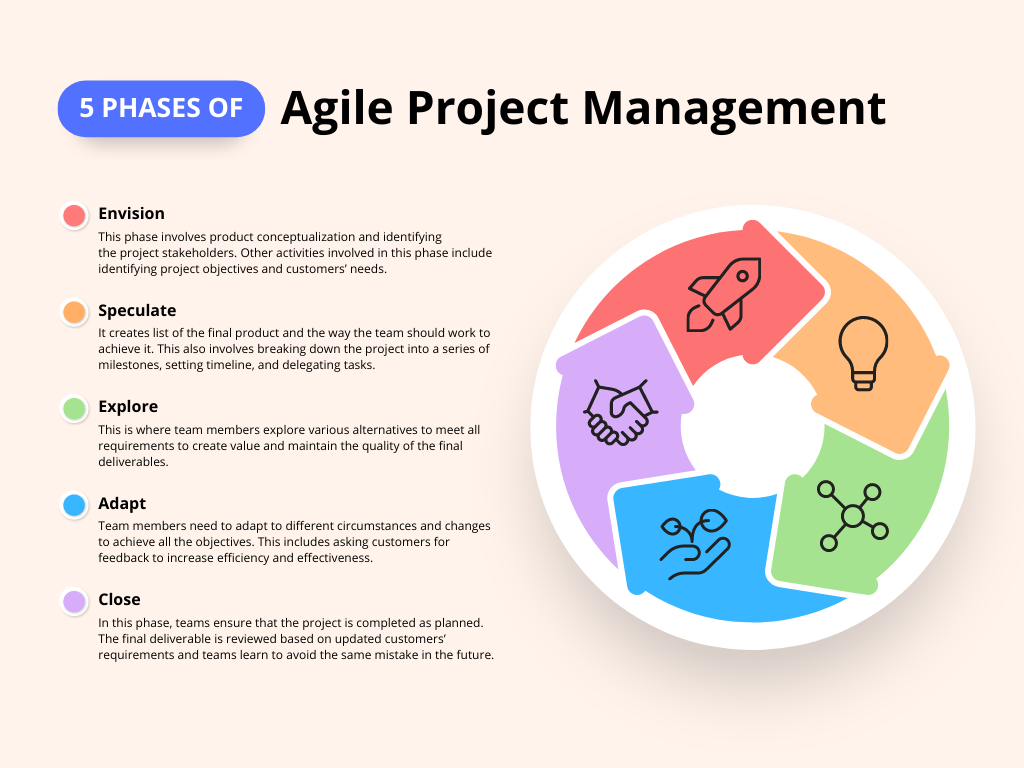
There is a growing demand for project management roles across various industries globally. This growth, as reported by the Project Management Institute, is estimated to reach 88 million by 2027. In light of this global trend, marketing teams are increasingly turning to marketing project management as a means to enhance workflow efficiency and boost employee productivity.
Marketing project management is a valuable tool that can assist teams in delivering high-quality projects within designated timelines and budgets. It encompasses various forms and objectives, and its significance extends beyond the marketing industry.
In this article, learn everything you need to know about project management in marketing, including the different types and things you should look out for if you intend to get into this field of project management.
What Is Marketing Project Management?

Marketing project management, simply, is the application of project management in the marketing field. It is the proper planning, overseeing, and delivery of marketing objectives while using a management framework.
This type of project management assists project teams in managing their scope, simultaneously informing key stakeholders and clients about the project’s progress and also engaging and collaborating with them.
The thought process behind this is that by making use of, and incorporating what we know as a project management framework, teams can achieve their aims early on and within specified budget. Teams can do this by ensuring that everyone involved in the project has a proper understanding of their roles and what is expected of them. This way, unnecessary tasks are eliminated.
If properly incorporated and used, internal marketing teams and external marketing agencies can find project management to be an important tool. This is because project management can be used in projects that involve featuring different marketing activities, for instance, SEO, content creation, and email marketing.
It is important to note that these are not the only activities that project management can be used for as there are many other activities under the marketing spectrum. However, such marketing-related projects or marketing projects must be short-termed initiatives since project management demands projects to be ‘temporary’. Also, these initiatives must have clear aims so that a management framework can be applied.
Why Project Management Is Required in Marketing
Because marketers are more likely to focus on the creative aspect than the administrative aspect of a project, it is easy for marketing teams to lose sight of the desired objectives without good project management. Project management is required in marketing for the following reasons:

- Complex campaigns
- Clear objectives
- Resource allocation
- Timeline and deadline management
- Stakeholder coordination
- Risk mitigation
- Performance tracking
1. Complex campaigns:
Marketing initiatives often involve multiple interconnected tasks, stakeholders, and deliverables. For example, a comprehensive marketing campaign may include activities such as market research, content creation, graphic design, advertising, social media management, event planning, and more.
Without effective project management, it can be challenging to keep track of all the moving parts and ensure that they are executed in a coordinated and timely manner. Project management provides a structured approach to organizing and managing these complex campaigns.
By implementing project management principles, marketing teams can better plan and coordinate their activities, ensuring that each task is completed in the right sequence and within the allocated time frame. This helps prevent delays, ensures smooth workflow, and increases the likelihood of successful campaign execution.
2. Clear Objectives:
In marketing, it is essential to have a clear understanding of what you want to achieve with the projects. This includes defining the specific goals, targets, and outcomes that you aim to accomplish. Without clear objectives, marketing efforts can become unfocused, inefficient, and less impactful.
Project management plays a vital role in setting clear objectives for marketing projects. It provides a framework for defining the scope of work, identifying target audiences, and determining the desired outcomes. Through effective project scoping and requirement gathering, project managers work closely with stakeholders to understand their expectations and translate them into specific and measurable objectives.
3. Resource Allocation:
Marketing projects require various resources, including budget, personnel, technology, and materials. Efficiently allocating and managing these resources is crucial to ensure the successful execution of marketing initiatives while maximizing return on investment.
Project management provides a structured approach to resource planning and allocation. It involves assessing the requirements of the project, estimating the resources needed, and creating a plan to allocate them effectively. This includes determining the budget required for different activities, identifying the necessary team members with specific skills, and securing the required tools or technologies.
Through project management, marketing teams can prioritize resources based on the project’s critical needs. This helps prevent over-allocation or underutilization of resources, reducing unnecessary costs and optimizing resource utilization.
4. Timeline and Deadline Management:
In marketing, there are often time-sensitive activities and campaigns tied to specific events, product launches, or seasonal promotions. Meeting these deadlines is crucial to capitalize on marketing opportunities and ensure the effectiveness of the initiatives.
Project management plays a vital role in the timeline and deadline management of marketing projects. It involves creating a well-defined project schedule that outlines the sequence of tasks, their durations, and dependencies. Project managers work with the team to develop realistic timelines, considering the scope of work, available resources, and external factors that may impact the project’s timeline.
By establishing clear timelines, project management helps in setting expectations and ensuring that all team members are aware of their responsibilities and deadlines. This promotes accountability and a sense of urgency, keeping the project on track and minimizing delays.
5. Stakeholder Coordination:
Marketing projects involve multiple stakeholders, including marketing teams, creative agencies, vendors, executives, and other relevant parties. Effective coordination and collaboration among these stakeholders are crucial for aligning efforts, managing expectations, and ensuring the project’s success.
Project management provides a structured framework for stakeholder coordination in marketing projects. It establishes clear lines of communication, defines roles and responsibilities, and sets up channels for collaboration and feedback.
Marketing project management also helps in managing and resolving conflicts among stakeholders in a marketing initiative. With different teams or departments involved in a marketing project, conflicts may arise due to differences in priorities, perspectives, or expectations.
By fostering effective stakeholder coordination through project management, marketing teams can align efforts, enhance collaboration, and leverage the expertise of various stakeholders. This leads to smoother project execution, improved decision-making, and increased chances of project success.

6. Risk Mitigation:
Marketing projects are subject to various risks and uncertainties that can potentially impact their success. These risks can arise from factors such as changing market conditions, competitive pressures, unforeseen challenges, or external events. Thus, it is essential for marketing teams to proactively identify and address these risks to minimize their impact on the project outcomes. And this involves several key steps:
- Risk identification
- Risk analysis and assessment
- Risk planning and mitigation
- Risk monitoring and control
By implementing effective risk management strategies through project management, marketing teams can minimize the negative impact of risks on project outcomes.
7. Performance Tracking:
It is crucial to track and evaluate performance to assess the effectiveness of strategies, measure the impact of campaigns, and make data-driven decisions to optimize results. Performance tracking allows marketing teams to understand what is working well and identify areas for improvement.
With project management, teams have a framework for tracking and measuring key performance indicators (KPIs) in marketing projects. KPIs are specific metrics that align with project objectives and indicate progress and success.
By implementing performance tracking through project management, marketing teams can gain valuable insights into the success and effectiveness of their initiatives. And this allows them to make data-driven decisions, optimize strategies, and continuously improve marketing efforts to achieve desired results.
What Is The Role of A Marketing Project Manager?
A marketing project manager plays a central role in managing and overseeing marketing projects from the beginning to the finish. Project managers in the marketing field have been entrusted with the duty of developing project plans, defining timelines and goals, along with resource requirements. Their other roles include the following –
- coordinating cross-functional teams, ensuring communication and collaboration, managing budgets, tracking expenses, and ensuring efficient use of resources.
- managing timelines and deadlines. They have the responsibility of creating project timelines, identifying dependencies, monitoring milestones, ensuring they remain on the right track to project completion, and making adjustments to ensure deadlines are met.
- carrying out potential risk assessments, monitoring risks, and developing strategies to mitigate these risks immediately.
- managing stakeholders by engaging with clients and executives, ensuring effective communication, and providing regular project updates. They address stakeholder concerns, gather feedback, and maintain strong relationships to foster collaboration and project success.
- tracking performance, establishing KPIs, analyzing data, and creating reports to provide recommendations for project improvements. They communicate project progress, achievements, and challenges to stakeholders, all to ensure accountability and transparency.
What Are The Skills Needed for Marketing Project Management?
There are a lot of skills needed to become proficient in marketing project management. Some of them are listed below:
- Project management expertise
- Communication and Collaboration
- Marketing knowledge
- Organizational and time management
- Analytical and problem-solving skills
- Leadership and decision making
- Adaptability and flexibility
1. Project Management Expertise:
This includes knowledge of project management methodologies, tools, and best practices. Familiarity with project planning, scheduling, resource allocation, risk management, and budgeting is crucial for successful marketing project management.
Getting project management certifications are a way to build and evidence one’s expertise in project management. Other ways of developing expertise in project management include listening to project management podcasts and reading books on project management.
2. Communication and Collaboration:
The ability to convey information clearly, actively listen, and facilitate productive discussions is vital. Collaboration skills, including teamwork, negotiation, and conflict resolution are also important for managing cross-functional teams and ensuring cohesive project execution.
3. Marketing Knowledge:
A solid understanding of marketing principles, strategies, and tactics is necessary to effectively manage marketing projects. This includes knowledge of branding, market research, digital marketing, content creation, social media, advertising, and campaign management. Understanding the target audience, competitive landscape, and industry trends helps in making informed decisions and guiding the team.
4. Organizational and Time Management:
Being able to manage resources, create schedules, and allocate time effectively is crucial for successful project execution. Attention to detail, planning, and the ability to adapt to changing priorities are valuable skills in marketing project management. Organizing also extends to setting up and managing the team’s workspace.
5. Analytical and Problem-Solving Skills:
Analytical skills allow marketing project managers to interpret data, assess performance, and make data-driven decisions. The ability to analyze market trends, track campaign metrics, and identify areas for improvement is valuable. Problem-solving skills help in addressing challenges, finding creative solutions, and mitigating risks that may arise during project implementation.
6. Leadership and Decision-Making:
The ability to provide clear direction, set goals, and empower team members contributes to project success. Effective decision-making skills are crucial for making timely and informed choices, considering different perspectives, and managing project constraints.
7. Adaptability and Flexibility:
The marketing landscape is dynamic and projects may face unexpected changes or challenges, which is why being able to adapt and become flexible is essential. Navigating ambiguity, embracing change, and adjusting strategies accordingly are all valuable in marketing project management.
The Marketing Project Management Process
Marketing project management has 5 general stages. For each of these stages to come to completion, there are several processes involved as part of the project’s life cycle. They are shown below:

1. Project Launch:
- Define the project objectives, goals, and scope.
- Identify who the key stakeholders are, and their roles.
- Conduct initial feasibility assessments and gather project requirements.
- Establish project governance and project team.
2. Organization:
- Create a comprehensive project plan to include timelines, deliverables, and milestones.
- Define project tasks, dependencies, and resource requirements.
- Create a budget and allocate resources
- Identify and assess potential risks and create risk mitigation strategies.
- Establish communication channels.
- Obtain necessary approvals and secure project resources.
3. Implementation:
- Carry out project tasks according to the plan.
- Monitor project progress, track milestones, and manage timelines.
- Coordinate and communicate with the project team and stakeholders.
- Ensure effective collaboration and resolve any issues that arise.
- Manage resources and budgets, making necessary adjustments as required.
- Incorporate marketing strategies, campaigns, and tactics.
4. Monitoring and Control:
- Continuously monitor project performance against key performance indicators (KPIs).
- Analyze data related to project progress and outcomes.
- Analyze project risks and apply risk mitigation procedures
- Have regular project status meetings and provide updates to stakeholders.
- Observe if there are deviations from the plan and take corrective actions.
- Maintain quality standards and stick to project objectives.
5. Completion Stages:
- Complete project deliverables and obtain necessary approvals.
- Conduct project evaluation and performance analysis.
- Document lessons learned and best practices for future reference.
- Celebrate project successes and acknowledge team contributions.
- Conduct post-project reviews and gather feedback from stakeholders.
- Finalize project documentation and archive project files.
What Are The Benefits of Marketing Project Management?
There are several benefits that project management offers to marketing teams and their organizations.
For one thing, marketing project management provides a well-structured framework that helps for proper planning, organization, and execution of market initiatives thereby ensuring that projects are finished within the specified time and budget.
It also helps to manage risks better and allows team members to work well together. Effective marketing project management allows performance tracking, providing the option of optimizing marketing strategies. It enhances the outcomes, increases efficiency, and contributes to the success of the marketing initiative, meaning more profit.
Should A Project Management Tool Be Used in Marketing Project Management?
The simple answer is yes. Because it makes the work easier.
A project management tool helps to eliminate unnecessary activities, improves collaboration, and enhances project organization. It also provides a platform to access and store project information and facilitate task and resource management. Project management tools usually offer automated features like Gantt charts and collaboration tools, with assist teams in staying organized and meeting deadlines.
Bottom Line
Marketing project management is essential because it ensures the effective planning, implementation, and control of marketing initiatives which leads to better resource management and more chances of project success. For this to happen, a marketing project manager should make sure that the planning, coordinating, and monitoring processes are effectively executed. He should also ensure team collaboration, manage resources, track project performance and mitigate risks, as well as make use of efficient project management tools. All of these would lead to delivering top-quality marketing initiatives.







